Located in the heart of downtown Phoenixville, Pennsylvania, The Colonial Theatre was built in 1902 and first opened its doors as a vaudeville house in 1903, with films following around 1915. Each year the theater attracts some 70,000 patrons to enjoy eclectic programming of both new and beloved films, along with community events such as Blobfest, which celebrates the theater’s role in the 1958 sci-fi classic The Blob. Following last weekend’s annual Blobfest, Bob Trate, The Colonial Theatre’s director of programming, spoke with Boxoffice Pro about the joys and challenges of exhibition.
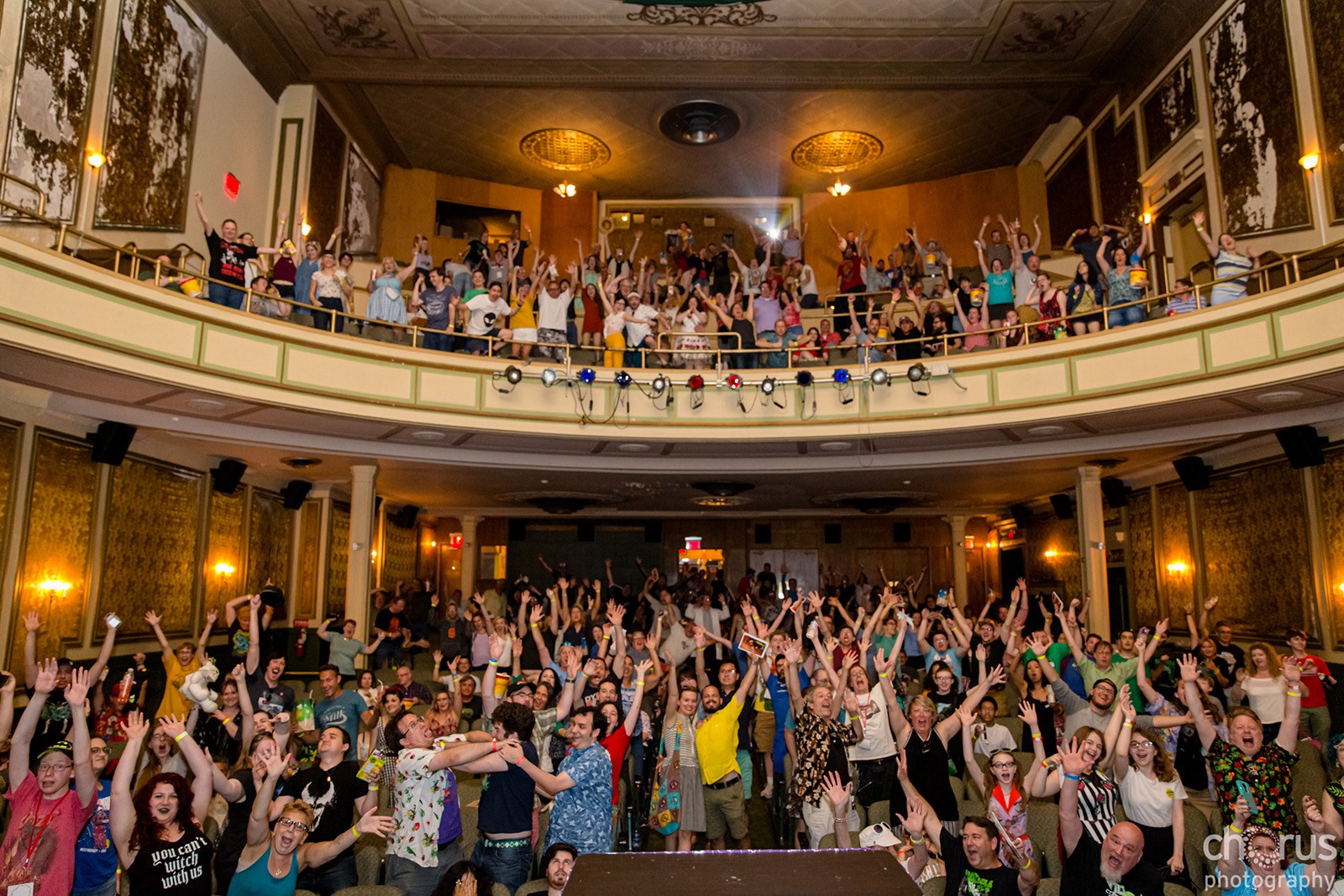
For those that don’t know, how did The Colonial find its way into film history?
Jack Harris, who was the producer of The Blob (1958), teamed up with a local film studio, Valley Forge Films, and got the film distributed through Paramount. Jack Harris rented The Colonial Theatre for three days for $75. That’s it. It always amazes me that he paid the owner $75 for three days. Jack said, ‘Don’t worry, I’ll make an immortal.’ And he did. It’s funny, because when we were going through the pandemic, we were doing a GoFundMe and trying to raise money to stay open for another month. A lot of the horror sites like Bloody Disgusting, Dread Central, and Rue Morgue were saying that the theater from The Blob needs help and were spreading the story. The local press, The Philadelphia Inquirer, was too, but the horror sites really took off. That kept us going and it’s amazing. People know who we are. They know that scene when everybody’s running out from under the movie theater marquee. That put us into a different stratosphere. It’s a nerdy flag to wave, but not every movie theater has that. We are a landmark piece of movie history. Steve McQueen made his name right here. The Blob was his first movie. It really did make us immortal.
Had that movie moment not happened, do you feel like The Colonial would still be around?
It’s interesting, because I do think about that from time to time. So many theaters have closed. We have that one thing that sets us apart from everybody else. It’s usually the second thing that people ask, ‘How old is the theater?’ And then, ‘Where was The Blob shot?’ I think in a lot of ways, it has made us this unique thing. I’ve looked at old newspaper clippings from the 70s, where they had a screening of The Blob to celebrate the 20th anniversary. It was never what Blobfest became in 1999, when the Association for The Colonial Theatre, a nonprofit, finally took control of the theater and decided that this was going to be an annual thing. It has grown into this three day festival, slowly encroaching on a fourth day. It’s all-encompassing for every member of the staff. We have a lot of volunteers and we have a lot of people who love to do just this and nothing else.
What happened at Blobfest this year?
This year we took a line from James Whale’s Bride of Frankenstein, “To a new world of Gods and Monsters,” and we changed it to ‘Blobs and Monsters’. We’ve never fully embraced the Universal Monsters at Blobfest. We’ve done Creature from the Black Lagoon numerous times because it was released the same year as The Blob. We had that connection and because it was the same year, we were celebrating the same anniversaries. We’ve had Rico Browning [who portrayed the Gill-man] here, when he was still with us. With next year being our 25th anniversary of Blobfest, we thought we’d celebrate the Universal Monsters this year. We had the 1958 The Blob, you could not have Blobfest without showing it, but we also decided that the 1988 The Blob remake was finally going to arrive at Blobfest. It has long not played at Blobfest, we’ve usually done it the week before for our Friday Night screenings. We do a 35mm screening of it. It always draws a big crowd and it’s a very different crowd. The R-rated horror movie crowd really loves that movie. Every year we have people ask why we don’t show it at Blobfest. Blobfest is very family friendly. You can come with the grandparents, bring the kids, and everybody can come and have a good time. The Blob ‘88 is a different animal. So we offered a late night showing of The Blob ‘88.
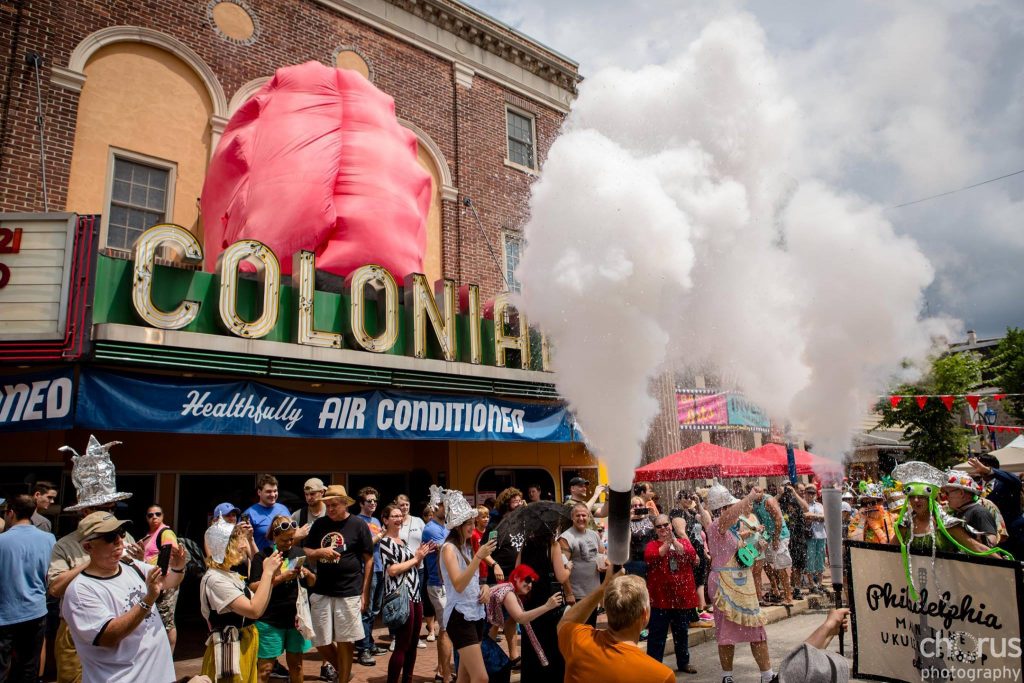
What are some of the main events across the three-day festival?
Friday is the reenactment of what happens in the movie. We have a full-on stage show with a live band and horror host Aurora Gorealis. This was her second year; she has a Rockabilly band called Beach Creeper. She’s really fantastic. She hosts the show with several recurring characters that have been with us for a long time. Our biggest one is Dash Daring; he’s an intrepid news reporter that always seems to get attacked by The Blob every year. He’s played by one of our volunteers named Chuck Francisco. He’s been with Blobfest probably over 10 years now. We have another volunteer named Matt McGinnis, who also works for Mystery Science Theater 3000 (MST3K). The irony is, he was the very first winner of our short film contest and turned that short film into a job with [MST3K series creator] Joel Hodgson. At one point on Friday night, the Blob escapes. Then everybody comes running out of the theater and into the streets of Phoenixville. We have the whole street blocked off. It’s like Mardi Gras out there. Everybody’s really into it. Local news stations from Philly all come and cover it. We’ve had drones, we’ve had helicopters. We light-up a big balloon of the Blob on our marquee. And then of course, we shoot Co2 fire extinguishers off when it’s over. It’s a lot of fun and another thing you can do with anybody; the kids, the parents, all walks of life and all ages come to Blobfest, which is one of the most endearing things about it.
Speaking of MST3K, they made their Blobfest debut.
We have a very good relationship with Mystery Science Theater 3000. They actually hosted their backers party for the last season here at the theater. We started talking about more things we could do together. They did a live recording at Blobfest in one of our theaters, with a live stream to the other two theaters, so that people could watch what’s going on. We know that we have some crossover crowd. A lot of their patrons that were here for the backers party had nothing but questions. They didn’t know what Blobfest was. You could see their gears turning, ‘Oh, there’s more of what I like. There’s more people out there like me that like these movies and enjoy them and embrace them and don’t make fun of them.’ We had a lot of good feedback from people and they were very excited to be here and loved the theater. We were giving tours during the party to people who wanted to see the projection room where The Blob attacked everybody.
What does it take to plan and execute a festival of this scale?
There’s always a budget and there’s always a game plan. The very first thing is that we need films outside of The Blob and those films shape the theme. We all talk as a staff and we talk with our regular volunteers like Matt McGinnis and Chuck Francisco. We try to get a sense of what we’ve done in the past; what’s worked, what didn’t work. It’s kind of funny, because people come regardless. Not everybody has seen Teenagers from Outer Space or The Tingler, but you still get a really decent crowd, because they’re generally interested in why we are pairing these films with The Blob. Some people don’t even do The Blob anymore, because they’ve seen it. We’ve shown it for 24 straight years. We get a lot of, ‘What else is going to be there?’ That’s fun, because you get somebody who’s interested in seeing something new along with what they already love. Once we get the films squared away, then we can really start to shape our marketing, the artwork, and the program. It does really become a very big collaborative effort once things start to fall in and then it all rolls together. We actually start talking about what worked and what didn’t work about a month after Blobfest is over. Every time you get to put this on, you get more and more people that want to contribute and help make it a bigger event and bring more people to Phoenixville.
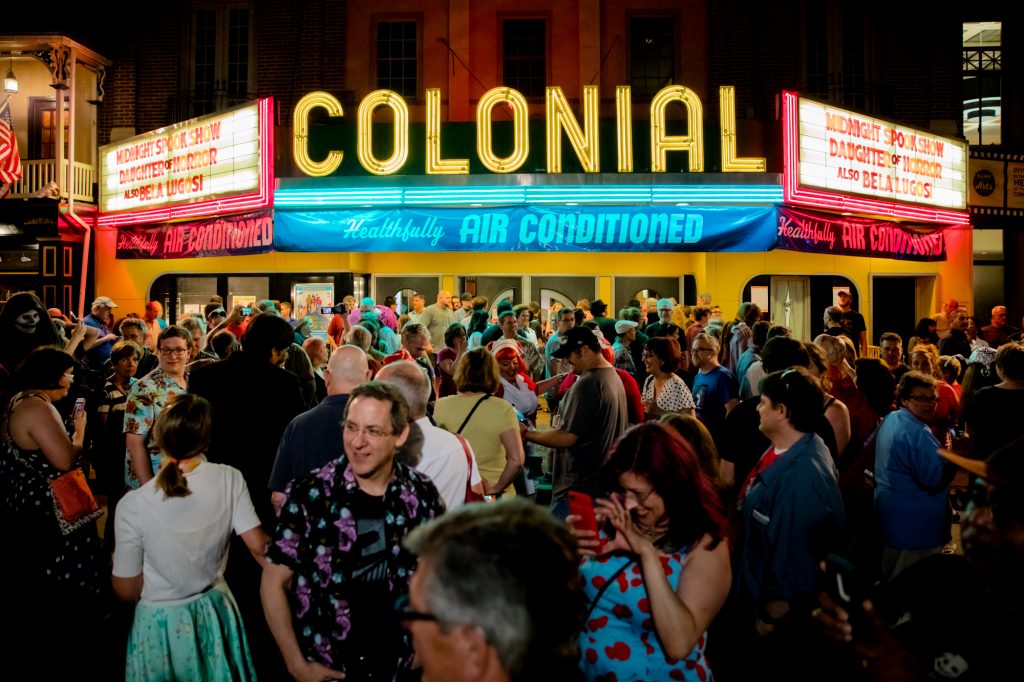
Blobfest isn’t the only big event at The Colonial, which offers a robust calendar of both new and repertory titles. What are some of the other annual and special events at The Colonial?
We do the 24 Hour Horror-thon with Exhumed Films. They’re a private group of collectors that formed an organization. They do a lot of repertory screenings, almost entirely on 35mm. That’s one of our newer annual events. So for 24 straight hours, we start the first movie at noon and it ends at noon the next day. The movies do not stop and you don’t know what the movies are. They lost their original theater down in Philly, so we invited them to come here and partnered with them. Their audience is now slowly becoming a lot of our audience members, where they’re coming and checking out our other films. It’s been a very mutually beneficial thing to partner with Exhumed. Then we do an Exhumed X Fest in the summertime, which is 12 hours of exploitation films. They’re all different, one will be Kung Fu, one will be sci-fi, it really runs the gauntlet. And again, none of those films are announced. We do some annual screenings. We do It’s a Wonderful Life every year. It’s one of the best moments of the holidays for me personally, and I think for the theater as well. So many family members come together to watch a movie. We make a big thing about turning phones off. ‘This is your chance to sit and watch the movie. As big as it is, you will see things you never saw before watching at home on TV.’ We do have an all-night Italian splatter fest, which is five Italian Giallo films. We’re in our 11th year of that. We have a Fright Night and Cult Cinema committee. As soon as one is over, we start planning out what we want to do for the next year, but it becomes harder to find film prints and who actually has the rights. That becomes part of the almost Indiana Jones quest, ‘How can I get the five movies that we really want to show, in the formats that we want to show them?’ The sooner we’re on it, the more we can roll with the punches. We try to get all the films first for the projectionists and let the DCPs play out through the midnight hours.
There you go, give the projectionist a break.
We also do ‘Nightmare on Bridge Street’, which is very Halloween based–we’re located on Bridge Street. This year, we’re doing a triple feature of Jason X, Freddy vs. Jason, and Saturday 14th. We have an October with a Friday the 13th, so we’re going all out with it. We’re always trying to stretch it. ‘What else can we do? What can we add?’ For some reason, where we are in Pennsylvania and the Northeast Corridor, there’s a lot of other competing events. Believe it or not, we have to worry about a drive-in that’s about an hour and a half away. We share a lot of the same audience members, so it’s something that we have to be aware of. We all get along and we’re friends, but we have to be mindful. If they’re doing a zombie fest, then we’re not doing a zombie fest the same night. It’s very amicable, they’ll do The NeverEnding Story and we’ll do five Italian horror films.
Along those lines, what are your biggest challenges in operating a vintage movie theater?
New movies are not drawing like they did pre-pandemic. It made us question our own identity, as well as what people want to see and what they associate with us. We did Big Trouble in Little China and drew over 100 people on one show. Our new movie that week may have had 100 people for the whole week. So the thing that we’re questioning is, ‘What do audiences really want to see? What marketing is behind a movie?’ Sometimes an actor or even a director isn’t enough. Everybody seems to be questioning why movies are so much longer since the pandemic. It’s another thing that has become a huge challenge for us, because Babylon looked right up our alley. If your wife works, or you work, you come home, you find a babysitter, and then all of a sudden, you’re like, ‘That’s a three hour movie. I can go see the 90 minute movie. I’ll get home quicker and we can still go out to eat.’ Is the movie enough for me to get myself over to a three hour epic of a brand new movie, or has the pandemic created comfort food for all of us? We showed Hocus Pocus during the pandemic for three weeks, a movie you could watch on Disney plus at home. We were lucky enough to get [screenwriter] Mick Garris to do a video introduction for us. He said, ‘This is a place to see it. In a theater. The home of The Blob.’ People came to see this movie over and over again. Is the experience and the comfort food more than seeing something new? We enjoy the repertory films, we enjoy spotlighting these movies. We know that we can show something like A Night at the Opera for minimal risk and people are going to turn out. As someone who loves film, I want to see new things too, but it’s such a double-edged sword. You want to give the audience what they want, you’ve got to stay in business, but you also have to look at the numbers. Then there’s always something that you’re not expecting. We ran A Man Called Otto and had people here for every show. ‘Are you coming for Tom Hanks? Why are you here?’ You want to pick their brains. What was it that called them out? So we have to appeal to our mission, our audience, and then look at our bottom line and think, ‘Is it really worth it taking a chance on some of these lesser known movies?’ It’s getting very difficult to take that chance.
The theater still has all of the touches that you see onscreen in The Blob. In terms of restoration and upkeep, how has the theater retained its vintage look?
We recently got so tired of looking at these old curtains that were in our original lobby. We took them down and we got a local painter to come in and paint the whole lobby over again. It was surprising how many people were shocked that they were gone, but also how many people didn’t even realize they were gone. It’s an interesting mix. I’ve been here for some very long 24-hour marathon events. If you stand in the same place long enough, you’ll see things you never saw before. I’ve seen gaps in the wall. I’ve seen screws sticking out from the wall. One day we were trying to figure out what was actually behind those boxes that cover the big old heaters that come up out of the floor. I’m like, ‘Wow, if we take those boxes off, we’ll probably know what the original carpet looks like.’ The heaters weren’t even under there. They were gone and they just left the boxes up, because they didn’t have enough carpet to cover the spot back up. The Colonial changed hands so many times up until 1999. It’s weird snippets of history here and there. We look at the wallpaper and go, ‘Is it wallpaper? Or did somebody actually just take like a stencil and paint on to the wall? And what’s behind the wall?’ There was not enough passing down of photographs from year to year to know. We really rely on some of our patrons who come in and say, ‘When I was six, the concession stand used to be right over there.’ We have to maintain the historical appearance of the theater. It’s very near and dear to everybody who works here and to the patrons. Keeping the marquee lit and the letters looking good. People like to see a repertory movie in the 1903 theater, because it reminds them of when they went to the movies as a kid. If you show Casablanca over in our newer theaters, nobody will come. There is where you see the divide with having something new and having something old. We have to maintain as much of the aesthetic of the theater as possible. We’re trying to maintain what the building looks like and it is a piece of film history. People expect it to look a certain way.
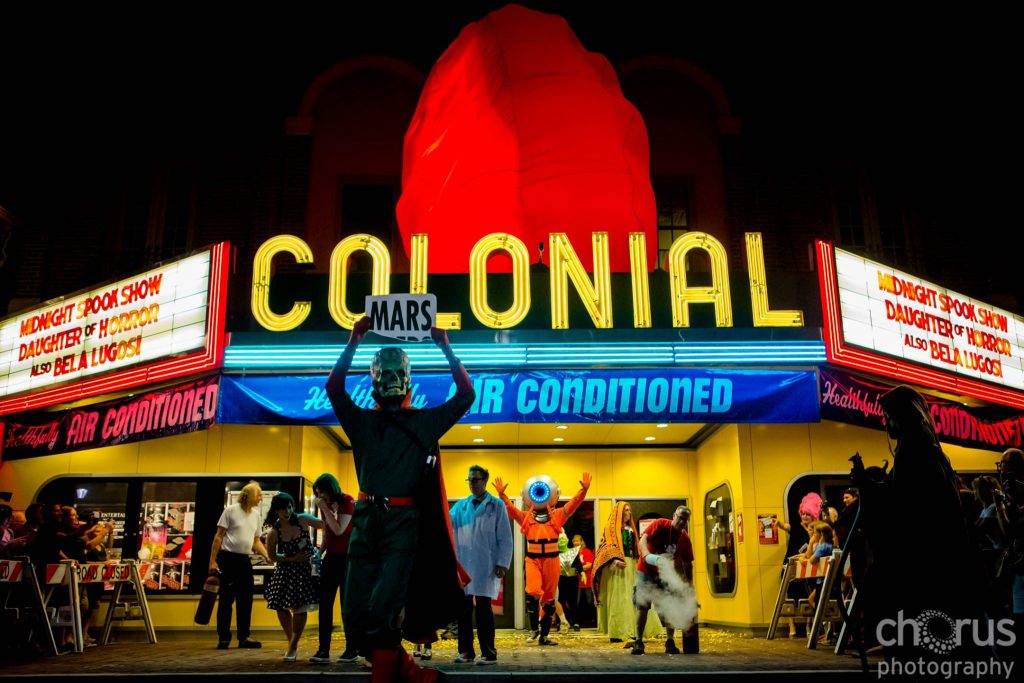
Do you have a favorite movie going memory at the Colonial?
The first time I was here I saw A Hard Day’s Night. A friend of mine’s wife was a big Beatles nut. There was a Beatles cover band that played all the music. I remember looking around going, ‘Ooh, this place looks like it’s gonna fall over.’ The next time that I really remember coming, I got out of work on a Sunday and I came to see The Mummy–the original 1932. I sat down and this little old guy who looked like Gandalf the Grey gets up and starts talking about the movie. The history of it and just doing the Turner Classic Movies thing. I was like, ‘Wow, that’s great.’ So I started getting off work more on Sundays and coming back over here. Nobody was doing it. And I was like, ‘Why don’t they talk about the movie. That’s why I’m coming.’ I just started doing the research on my own. I emailed them and said, ‘I would really like to come and talk about the movie beforehand. I went to film school. I would love to do that every Sunday. I don’t care what the movie is. I’ll tear tickets or whatever, before the movie starts. I just want to talk about the history of the film, whatever it is.’ And they said, ‘Okay’.
Is that how you got started in exhibition?
That’s how I got started here. I was just this guy who came on Sunday and introduced the movie. I paid for months. Then they were like, ‘Why are you paying? You’re introducing the movie.’ And I’m like, ‘Okay, so now I get to go for free?’ Masterplan. The first movie I introduced was the Audrey Hepburn film Charade. It was Audrey Hepburn month. I really hit a month of movies I’d never seen. I’d say who the President of the United States was, what else had come out on the same day. Things to set a mood for what we were about to see. I still do that to this day. I went from this volunteer who just came to introduce movies, to the programming director. Ironically enough, I didn’t know it at the time, but my wife was sitting on the other side of the theater. And by the way, Gandalf the Grey, his real name is Ted the Fiddler and he is our projectionist. When I became a programming director, we needed another projectionist. Ted wasn’t here anymore, but I called Ted up and I was like, ‘I need you to come back in. Because I’ve got a 24 hour marathon. I need someone I can trust up there who’s going to help run the projector.’ And he’s like, ‘Okay, I’ll come back.’ Now he’s literally the guy up in the booth doing a Fright Night show or anything we want him to do. Ted does not know that story about me. I’ve tried to tell that story several times with him in the audience, but then he doesn’t show up that day.
What do you hope guests, whether local or visiting from across the country, will take away from their experience at The Colonial Theatre?
One thing that I really want people to remember or experience for the first time, is that there is a place that really holds movies in reverence. For me, going into movies is like coming to church. You sit there, you’re quiet, you give yourself over to the movie or ‘the sermon’ that’s being presented. It’s a whole other experience. You could see a comedy, you could see something terrifying, something that’s inspiring. It could be all three of those in one thing, but you have to give yourself over to the movie, to the director, to the actors. I don’t think people do that anymore. We make a really good effort to say, ‘Hey, you’re sitting in a theater that’s 120 years old this year. You took a break, you bought a ticket for a vacation from your cellular device. Put it down. No one cares that you’re here. You can brag that you’re here afterwards. Sit down and watch the movie with us. Listen to everybody else around you, because you’re going to laugh at something you haven’t laughed at for years, or you’ll be scared, or you’ll have the enjoyment of the person next to you being scared, because you knew the jump was coming. You’re going to fall in love with the movies again.’ We have enough people here, thank God, who really have attached themselves to that. They know when they come here to see a movie, it’s going to be a different experience. No TV is as big as the screen that we have. That’s what’s fantastic about it. We had a kid the other day and he was going to see Big Trouble in Little China with his dad for the first time. That’s what makes it fun. When you went to see The Empire Strikes Back or a new James Bond movie, that was an experience. You don’t forget that first experience. So in a lot of ways, we get people back to experience that first experience again, or a reminder of what it was like when you saw that film for the first time.

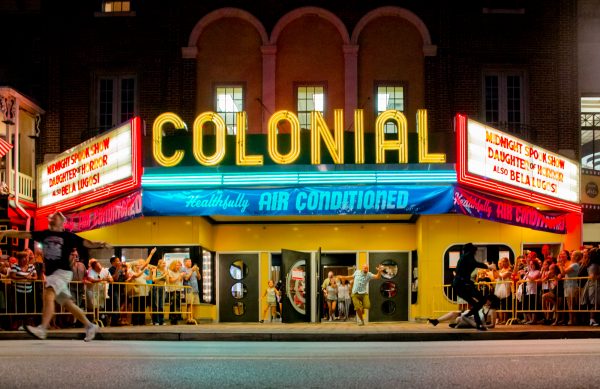

Share this post